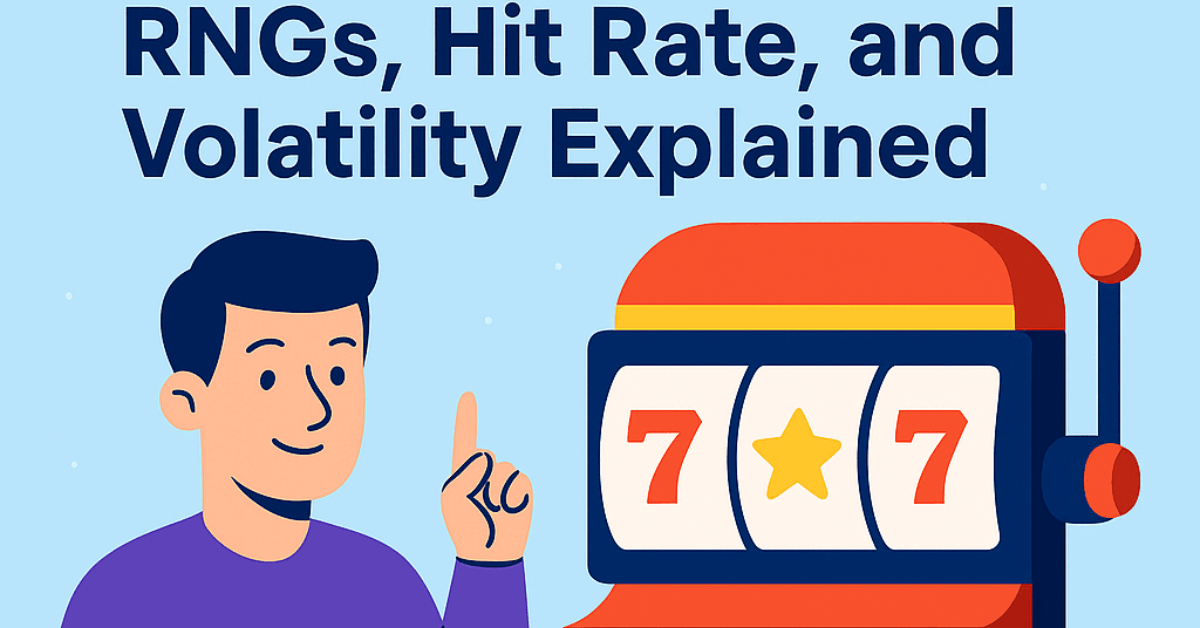
📍 Intro – Why Slot Game Math Matters
Slot games may seem like pure luck, but behind the spinning reels lies a complex mathematical system. These systems — known as slot game math models — define everything from how often you win to how big your payouts can be. Understanding them helps you choose better games, manage your bankroll, and play more responsibly.
🔢 What Are Slot Game Math Models?
A slot game math model is the underlying formula that controls how a slot behaves. It’s not just about spinning and winning — it’s a set of rules that determines:
- When and how often wins occur
- How much the slot pays out
- How volatile or steady the game feels
- Bonus trigger rates and feature design
Every licensed game is built using these models and tested by independent labs to ensure fairness.
🎰 RNG – Random Number Generators Explained
The Random Number Generator (RNG) is the core component of all slot machines.
RNGs work by generating thousands of random number sequences every second, even when you’re not spinning. When you click “Spin”, the RNG stops and selects a result that maps to a reel position.
- Every spin is independent
- There’s no such thing as a “hot” or “cold” machine
- You cannot predict or influence the outcome
💡 Fact: Independent testing agencies like iTech Labs, GLI, and eCOGRA certify that RNGs are fair and unbiased.
🎯 Hit Rate – How Often Do You Win?
Hit rate refers to the percentage of spins that result in any kind of win, even small ones.
- A 25% hit rate means you’ll land a win in 1 of every 4 spins, on average.
- But this says nothing about how much you win — just how often.
High hit rate slots offer frequent small wins (like Starburst).
Low hit rate slots offer rare but big wins (like Dead or Alive 2).
⚖️ Volatility – Measuring Risk and Reward
Slot volatility is a critical aspect of the math model. It defines the risk level of a game:
- Low Volatility: Frequent, smaller wins
- Medium Volatility: Balanced wins and frequency
- High Volatility: Infrequent, but larger wins
Each volatility level appeals to different player types:
| Volatility Type | Ideal For |
| Low | Casual players, longer sessions |
| Medium | Balanced risk/reward |
| High | High rollers, jackpot hunters |
📈 RTP – Return to Player Rate
RTP (Return to Player) tells you the average expected return over millions of spins.
- Example: A 96% RTP means the slot is expected to pay back €96 for every €100 wagered — over time.
- But RTP is not a guarantee for individual sessions. It’s long-term data.
🎯 Always check the RTP before playing — many casinos let you view this in the game info section.
🎁 Math Behind Bonus Features & Max Wins
Slot game features like Free Spins, Cascading Reels, and Multipliers are also mathematically modeled. Developers use formulas to:
- Decide how often features are triggered
- Calculate multiplier probability
- Set a maximum win cap (e.g., 5,000x)
This math ensures balance between excitement and profitability.
🏦 House Edge vs. Math Model
The House Edge is the inverse of RTP:
- RTP = 96% → House Edge = 4%
Slot math models are designed to give casinos a small but statistically consistent edge, while still providing enough excitement and win potential to attract players.
🎨 Provider Style: How Math Varies by Studio
Different slot developers use math creatively to appeal to specific player groups:
- NetEnt – Balanced gameplay (medium volatility, 95–97% RTP)
- Pragmatic Play – Fast-paced, often with high volatility
- NoLimit City – Extreme volatility, high max wins, edgy mechanics
- Play’n GO – Reliable medium volatility classics like Book of Dead
Every provider uses unique math blueprints to define their signature style.
🔐 Responsible Gambling & Math Models
Understanding the math behind slots can help you avoid chasing losses or misinterpreting randomness.
- Don’t assume a win is “due”
- Use built-in tools like loss limits and session reminders
- Consider setting a budget based on game volatility
➡️ Read more on our Responsible Gambling Guide to stay in control.
📌 Final Thoughts: Know the Math, Play Smarter
Slot game math models might sound complex, but they play a huge role in your overall experience. Whether you’re chasing jackpots or playing for fun, knowing about RNGs, hit rate, volatility, and RTP helps you make better decisions and enjoy games responsibly.